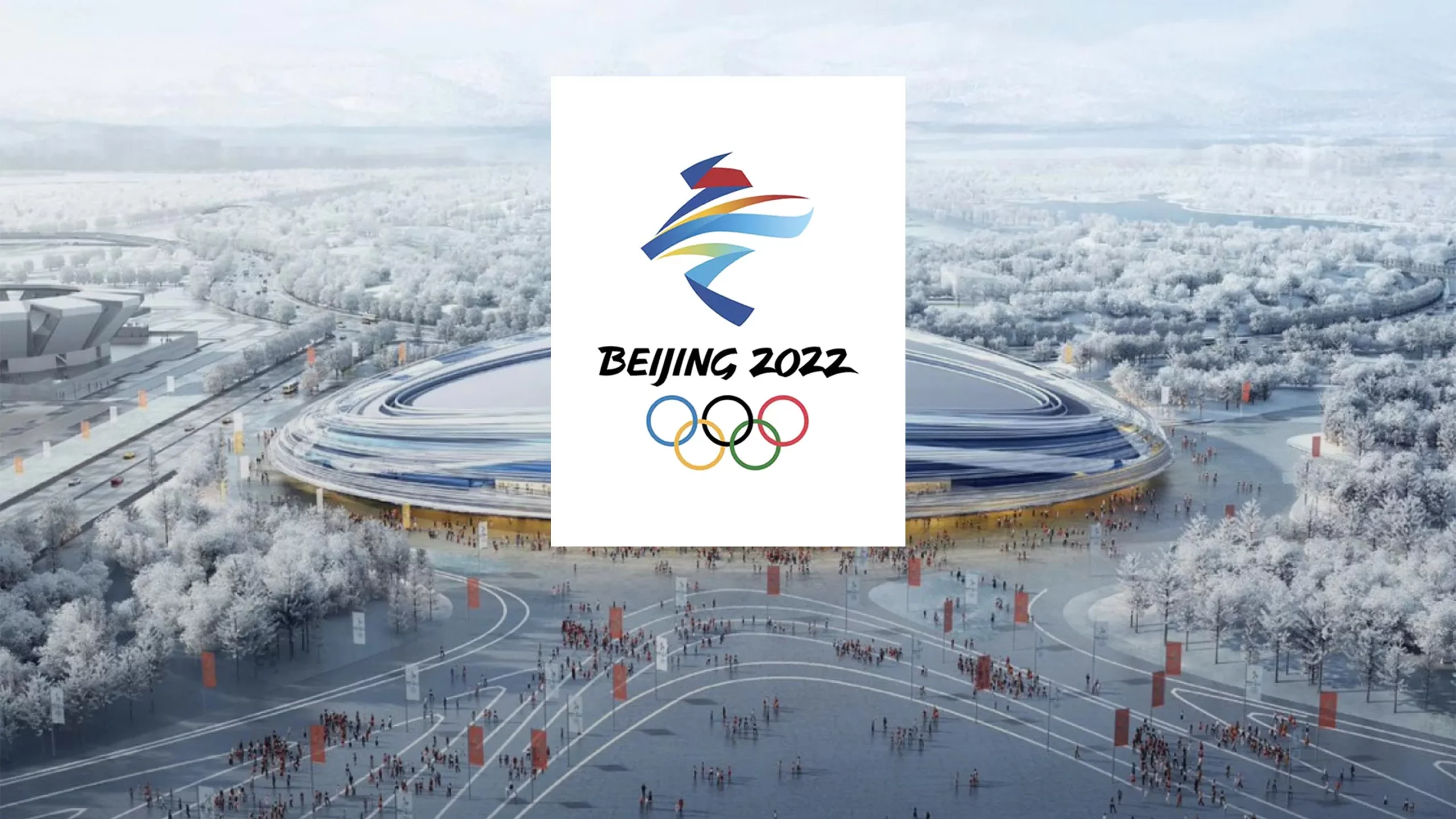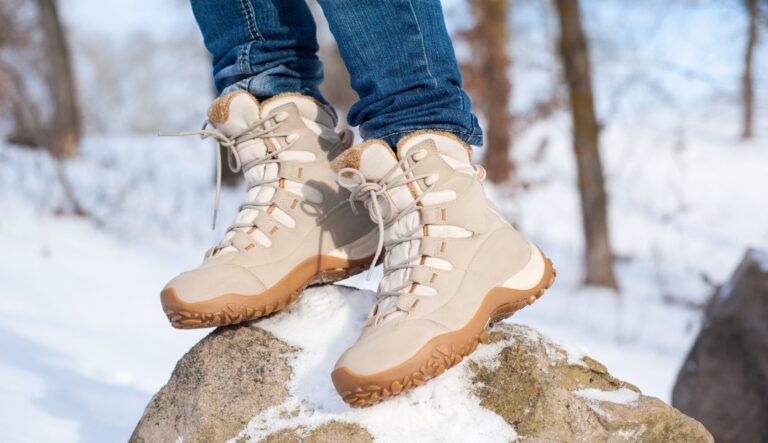China’s efforts to increase participation in snow and ice sports among Chinese citizens have led to a market boom in the winter sports industry. With memorable achievements made by athletes in the 2022 Beijing Winter Olympic Games, China’s winter sports market will not be slowing down anytime soon. Since 2015, Beijing has been determined to organize a clean, green, and inclusive Winter Games to tackle global challenges and protect the environment. Preparations for the Beijing Winter Olympics have generated interest in new sources of economic revenue, changes in marketing strategies, and trends to adapt to, thus driving consumers’ interests in winter sports. Winter sports have grown to appeal to Chinese consumers’ becoming one of the most popular leisure activities, an interesting turn as many previously viewed winter sports as being niche and expensive.
To prepare for the Beijing Winter Olympics, China underwent many changes to its transportation infrastructure, including building high-speed rail links to the three Olympic venues (Beijing, Yanqing, and Zhangjiakou), which reduced travel time from 3 hours to less than 60 minutes. China constructed this, hoping to increase consumer spending and boost the popularity of snow sports and the tourism industry brought on by the Winter Olympics. China’s local economy is receiving new sources of growth from consumers’ interest in winter sports, including but not limited to rental venues and classes within the winter sports industry and the winter sports brands market.
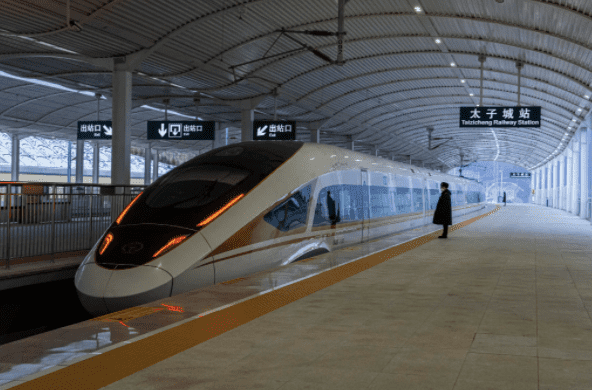
What does the Beijing Winter Olympics mean for national pride?
All around the world, citizens associate an athlete’s skills and performance with their country’s national pride. Freestyle skier Eileen Gu and figure skater Zhu Yi are two American citizens who represented China at the Winter Olympics but have received drastic responses from the public. Eileen Gu, known as the “snow princess” due to her skiing skills, has been recognized on Chinese social media for influencing the popularity of winter sports in China. After winning gold in the women’s big air freestyle skiing, netizens began applauding her family’s outstanding education, her early success in sports and as a model, as well as her fluency in speaking Chinese.
From the very beginning, netizens criticized Zhu Yi for taking the spot of another Chinese national to represent China. After crashing into a wall during free-skating and dropping China’s ranking from 3rd to 5th place, Zhu Yi became a victim of cyber-bullying with the hashtag #shameonzhuyi and #zhuyihasfallen trending. Eileen Gu’s and Zhu Yi’s social media accounts ranged in responses; many people congratulated Eileen Gu, while others bashed on Zhu Yi, telling her to “go back to America” and shaming her for her inability to speak Chinese. The Beijing Winter Olympics showed two differing reactions coming from netizens among Chinese social media.
Other examples of athletes who emphasize on how national pride is associated with achievements and breakthroughs are highlighted by Su Yiming and Xu Mengtao. Su Yiming, a 17-year-old former child actor, who won the Olympic gold in the snowboard men’s big air event, became one of China’s first snowboarding medalists and China’s youngest Winter Olympic champion. Beyond his success, he serves as an inspiration for many younger generations in China and elsewhere. Another athlete, Xu Mengtao, breaks China’s five silver medal streak in freestyle skiing women’s aerials by winning a gold medal for the first time in history.
Sustainability: How China built its plans for the Beijing Winter Olympics
To achieve its carbon neutrality goal, Beijing 2022 organizers have set plans for the creation of low-carbon venues, transportation, and energy usage. Their goal is to integrate low-carbon concepts into all Olympic Games preparation and measures. Since Beijing is the first city to hold both summer and winter Olympic Games, it will reuse six of its past venues (such as “The Water Cube” and “The Bird Nest”), which will allow for a minimized environmental footprint. According to the Beijing Organizing Committee for the 2022 Olympic and Paralympic Winter Games Report, renewable energy supplied by the new renewable power grid that transfers wind and solar energy from Zhangjiakou to Beijing will power all venues. According to the plan, 18 carbon reduction measures and 4 carbon-neutral measures were identified and implemented during the Beijing Winter Olympics. This will be the first Olympic Games to achieve carbon neutrality, meaning that 100% of the Olympic Games will be powered by renewable energy. After the Olympics, the venues will be reused towards a diverse number of commercial activities such as mass fitness centers and the development of competitive sports.

In terms of transportation, fuel-efficient and clean-energy vehicles accounted for 1,807 total hybrid vehicles, 800 hydrogen-fueled vehicles, 500 natural gas-fueled vehicles, and 370 pure electric vehicles. As for ice-cooling methods, natural carbon dioxide refrigeration systems will replace hydrofluorocarbons (HFCs) to reduce carbon emissions by cutting heat waste and energy consumption. HFC has been proven to damage the Earth’s ozone layer and contributes to global warming. Therefore, the new technology will produce advantageous effects towards producing a low climate impact. This will also be the first time China and the Olympics committee will use carbon dioxide refrigeration in an Olympic winter game.
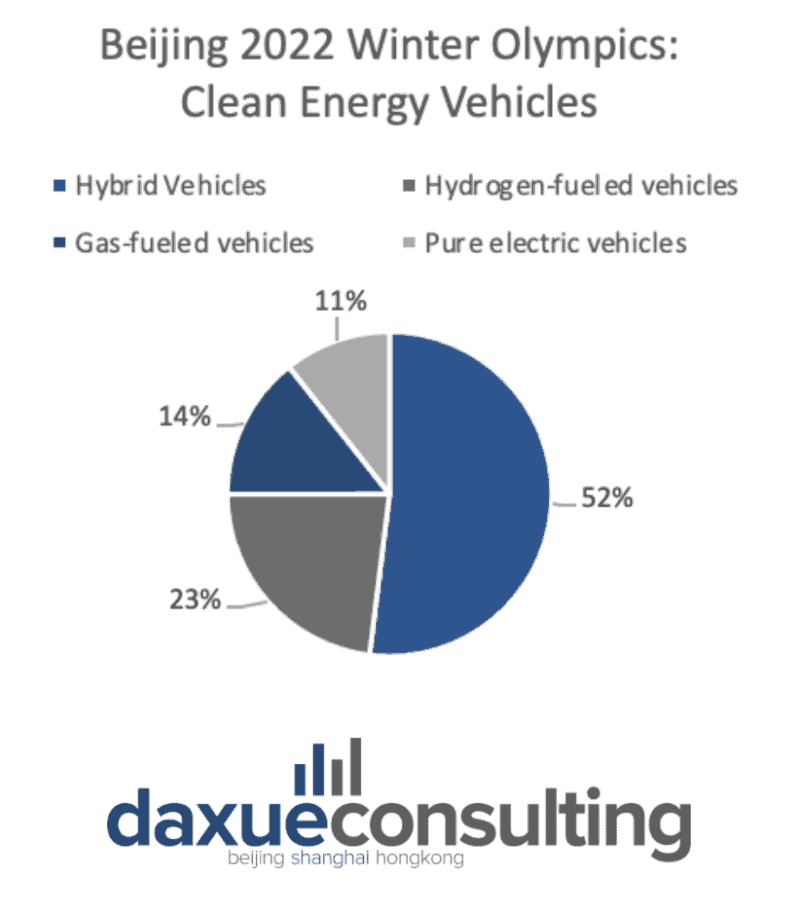
Data Source: Designed by daxue consulting, Graph portrays the type of clean energy vehicle and percentage used at the Beijing 2022 Winter Olympics
China’s environmental vision for Beijing Winter Olympics temporarily slows market economy
China’s goal of achieving a sustainable framework for the Beijing Winter Olympic Games is to provide positive environmental effects, a new development for the region, and a better life for its people. However, China’s role as a host for the Olympics has negatively impacted its economy through the halt of factory production. Environmental efforts to reduce pollution and smog for perfect blue skies have stressed domestic supply chains and workers during the Olympics. Industrial areas such as Hebei, Shanxi, and Shandong are experiencing supply-side shock with restrictions on factory production that hinder domestic growth and raw material production like coal, steel, and aluminum. Local governments have ordered factories within these regions to reduce or halt production to cut severe air pollution that will last until the end of the Olympics in mid-March.
China’s attempts to bring carbon emissions to a peak by 2020 have disproportionate effects on different provinces and economies in the North. Although the regions in Northern China account for 35% of gross domestic product, they account for 67% of China’s carbon emissions. Since heavy industry occurs in the North, reducing the number of carbon emissions will have a greater positive impact on the economy. Halting factory work has negatively impacted workers’ salaries with reduced operations and income slashes. For example, although forklift drivers are one of the least affected in the factory, workers’ working hours have still been cut from 7 to 3 days.
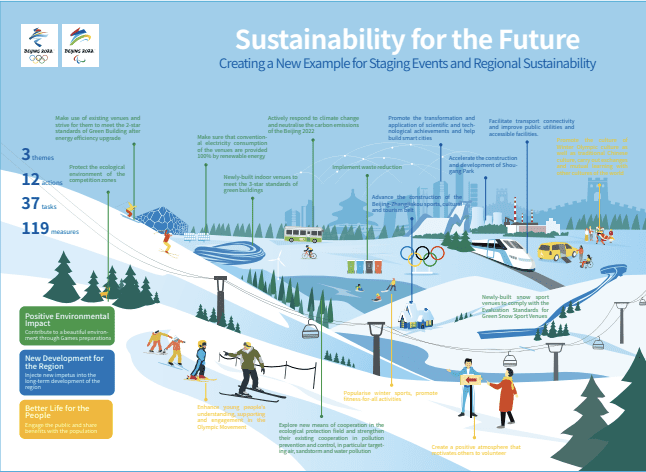
Beijing Winter Olympics: What’s Next for Brands
The booming popularity of the Beijing Winter Olympics shows economic growth in the winter sports industry that all brands benefit from fueling consumers’ interest by partnering with athletes. Brands will stray away from traditional celebrities for partnerships and move towards people who are achieving success in other areas, specifically in sports. As of 2020 and 2021, there were over 250 Olympic-related deals, with Eileen Gu being one of the most sought-after sports athletes. She has helped popularize domestic winter sports in China in such a short time and has been the perfect ambassador, connecting with both the East and the West. Su Yiming, a role model for China’s youth, landed his first brand deal with snowboard manufacturer Burton at the age of 7, showcasing his passion for snowboarding from a young age.
The Beijing Winter Olympics’ success in promoting winter sports as a leisure activity has led to increased demand for domestic clothing brands, including winter sports equipment and the sportswear market. Anta has had a surge of interest in winter sports and is working hard to keep up with demands. As the official Olympic partner, Anta has been providing Team China with outfits for 7 years now. After the Olympics, Anta intends to continue focusing not only on Olympics-related sports, but also on Chinese sports by working with winter sports federations, endorsing national teams, and running grassroots programs to make more people learn how to participate in winter sports.

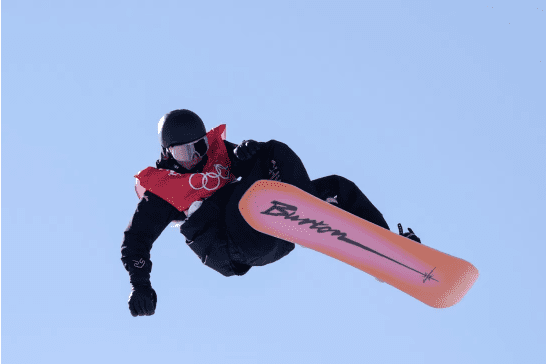
Beijing Winter Olympics Mascot: Hot market commodity
The official mascot of the 2022 Beijing Winter Olympics is Bing Dwen Dwen, a fluffy panda made of ice that symbolizes the strength, determination, and spirit of Olympic athletes. The meaning behind its name comes from its mandarin origins where “Bing” highlights ice, purity, and strength, while “Dwen Dwen” means robust, lively, and represents children. An official NFT collection of Bing Dwen Dwen was launched recently and will be on sale in the U.S. but not China. The collection is made by nWay, maker of a mobile game, and it consists of a series of digital-themed collectibles with different levels of rarity. Despite these NFT collections, Bing Dwen Dwen has been a best-selling souvenir leading to a shortage in supply.
Several Olympic partners including Alibaba released a limited NFT Olympic collection of cloud emblems featuring four sports events and includes Chinese traditional elements with a unique sequence. Anta distributed two NFT products of the Chinese delegation’s clothing with limited availability. While Anta hopes to explore the future of consumer experience, Alibaba wants people to be curious about the virtual world. While NFTs are known as non-fungible tokens elsewhere, in China they are referred to as “digital collectibles” due to the Chinese government’s opposition to cryptocurrency. The ending of the Olympics, regardless of citizens’ inability to purchase a Bing Dwen Dwen NFT, serves as a memory of the resilience and passion for the Beijing Olympics Winter games.
What the Beijing Winter Olympics means for the Chinese economy
After this year’s Olympics, China will become the first country to complete the Olympic Slam, which includes the Summer Olympics, Summer Paralympics, Youth Olympics, Winter Olympics, and Winter Paralympics. This huge milestone incentivizes China to increase its citizens’ interest in winter sports through various methods, including building new infrastructures for ski classes and encouraging winter sports brands to provide convenient retail spaces for equipment to be purchased all together for beginners. The Olympics have emphasized that Chinese consumers’ passions for winter sports have grown as they embrace and try ski and snow sports for the first time. The Beijing Winter Olympics have had an impact on the Chinese economy by establishing the stage for market trends and sustainability to be implemented.
- Setting the path for future Olympic games through its innovative new sustainable efforts and reducing its footprint through its achievement in hosting a carbon-neutral Olympic game from all aspects, including venues, transportation, and ice-cooling methods
- As a host for the Beijing Winter Olympics, China has suffered a supply-side shock in its market economy, affecting the living wages of workers as factories cannot operate at full capacity, hoping a decrease in pollution will lead to clear blue skies for the Olympic Games.
- The Beijing Winter Olympics’ success in promoting winter sports as a leisure activity will lead to an increase in demand for domestic winter clothing brands such as Anta
- Citizens all around the world associate an athlete’s skills and their performance to a country’s national pride; this year’s most notable athletes (Eileen Gu and Zhu Yi) emphasize that the response in public opinion is heavily tied to their success and accomplishments
- With COVID-19, Chinese consumers have shifted their perspectives from traveling abroad to partake in winter sports to staying within their country
- Even after the Olympics hype dies down, brands will shift away from traditional celebrity partnerships and move towards working with people who have achieved success in other areas, specifically in sports
- The 2022 Beijing Winter Olympics mascot, Bing Dwen Dwen has been a hot market commodity with its limited popular NFT collection. However, it not available for purchase in China due to restraints against cryptocurrency
- As part of the official Olympics committee, Anta and Alibaba released rare and limited digital collectibles for purchase that would allow consumers to explore the digital world and improve their experiences
Author: Daiane Chen


